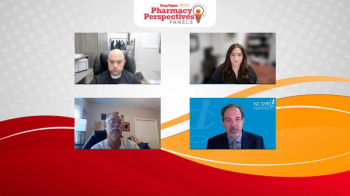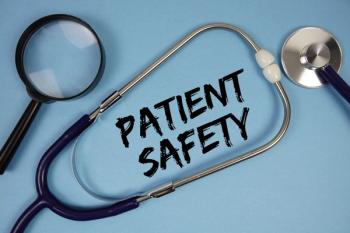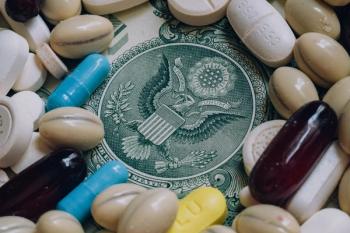
Pharmacists navigate the evolving landscape of cannabis, balancing patient expectations with emerging evidence on cannabidiol and tetrahydrocannabinol for various medical conditions.

Pharmacists navigate the evolving landscape of cannabis, balancing patient expectations with emerging evidence on cannabidiol and tetrahydrocannabinol for various medical conditions.

In part 3 of our interview with Megan Smith, PharmD, she discusses the common reasons for hesitancy among patients, specifically for the pneumococcal vaccine.

Laura Mark, PharmD, MHM, FASHP, FABC, and Arpit Mehta, PharmD, MPH, MHA, CPEL, FASHP, discuss the immense role automation has shouldered within pharmacy compounding.

As the pharmacist's scope of practice grows, so does the imperative to prove economic and clinical outcomes to payers, policymakers, and the pharmaceutical industry.

Explore the complexities of cannabinoids, focusing on cannabidiol and tetrahydrocannabinol, their effects, side effects, and potential drug interactions in modern use.

Laura Mark, PharmD, MHM, FASHP, FABC, and Arpit Mehta, PharmD, MPH, MHA, CPEL, FASHP, discuss various roles in centralized IV compounding and robotics.

Annie Lambert, PharmD, BCSCP, discusses compliance solutions and the common gaps existing in the pharmacy compounding industry today.

Lani Bertrand, RPh, discusses Omnicell’s IV compounding solution and how it’s realizing cost savings for pharmacies across the country.

Megan Smith, PharmD, breaks down the public health sector’s current understanding and approach toward pneumococcal vaccines.

Misinformation, limited understanding of biosimilars, and inconsistent insurance policies only add to the confusion.

As hospitals and health systems aim to improve outcomes, pharmacists have a large role in managing these conditions with pregnancy-specific therapies.

In part 3 of our interview with John C. Goodman, PhD, he discusses how TrumpRx could impact the drug supply chain—specifically PBMs.

Independent pharmacies face significant challenges—such as software limitations, staffing shortages, and inconsistent billing requirements—that hinder fair reimbursement for clinical services.

John C. Goodman, PhD, senior fellow at the Independent Institute, discusses TrumpRx and its goals for patients’ OOP drug costs.

Community pharmacies are facing major barriers due to PBM practices and vertical integration, ultimately jeopardizing patient access and trust in health care.

Catie Stimmel, PharmD, discusses the pharmacist’s role in ensuring PSOs operate at their intended capabilities.

Morgan McSweeney, PhD, discusses how social media highlights the most emotionally charged voices, often those offering anecdotes or outrage over careful analysis.

Catie Stimmel, PharmD, discusses what PSOs are and how they are protecting patients all across the US health care system.

High-profile figures often share misleading health information, highlighting the need for trusted and evidence-based content in social media discussions.

Conflicting health guidance from authorities creates confusion and erodes public trust, impacting access to medical care and long-term health outcomes.

Rick Sage, executive vice president of innovation and standards with the NCPDP, discusses the nuances of billing under either Medicare Part B or D.

Steve Leonard, PharmD, BCIDP, joins Drug Topics on World Pneumonia Day to discuss pharmacists’ role in managing the disease.

To celebrate World Pneumonia Day, Steve Leonard, PharmD, BCIDP, joined us to discuss the variety of pneumonia types and the treatment options commonly prescribed.

Clipper F. Young, PharmD, MPH, CDCES, BC-ADM, BCGP, discusses risks and approaches associated with severe insulin resistance among mothers and their children.

Pharmacy evolves from product-based to holistic care, emphasizing clinical services and patient management, driven by passionate future pharmacists.

Pharmacy professionals gather to discuss innovative solutions, fostering collaboration and community engagement at the National Community Pharmacists Association 2025 Convention & Expo.

Clipper F. Young, PharmD, MPH, CDCES, BC-ADM, BCGP, discusses his experience in diabetes care and how the pharmacist’s role has evolved throughout his professional career.

Lisa Schwartz, PharmD, discusses her general opinions regarding how the predicted success of the Medicare Drug Price Negotiation Program’s future implementation.

Lisa Schwartz, PharmD, discusses the importance of the Medicare Transaction Facilitator as community pharmacies head into a new year of the Medicare Drug Price Negotiation Program.

The final part of our interview with Dae Lee, PharmD, Esq, CPBS, and Lucas Morgan, Esq, focuses on the relationships between state- and federal-level PBM reform.